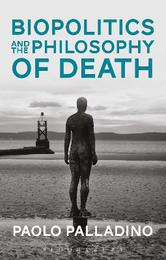
|
Biopolitics and the Philosophy of Death
Paperback / softback
Main Details
| Title |
Biopolitics and the Philosophy of Death
|
| Authors and Contributors |
By (author) Paolo Palladino
|
| Physical Properties |
| Format:Paperback / softback | | Pages:288 | | Dimensions(mm): Height 216,Width 138 |
|
| Category/Genre | Social and political philosophy
Philosophy of science |
|---|
| ISBN/Barcode |
9781474282994
|
| Classifications | Dewey:113.8 |
|---|
| Audience | | Postgraduate, Research & Scholarly | |
|---|
|
Publishing Details |
| Publisher |
Bloomsbury Publishing PLC
|
| Imprint |
Bloomsbury Academic
|
| Publication Date |
20 October 2016 |
| Publication Country |
United Kingdom
|
Description
While the governance of human existence is organised ever-increasingly around life and its potential to proliferate beyond all limits, much critical reflection on the phenomenon is underpinned by considerations about the very negation of life, death. The challenge is to construct an alternative understanding of human existence that is truer to the complexity of the present, biopolitical moment. Palladino responds to the challenge by drawing upon philosophical, historical and sociological modes of inquiry to examine key developments in the history of biomedical understanding of ageing and death. He combines this genealogy with close reflection upon its implications for a critical and effective reading of Foucault's and Deleuze's foundational work on the relationship between life, death and embodied existence. Biopolitics and the Philosophy of Death proposes that the central task of contemporary critical thought is to find ways of coordinating different ways of thinking about molecules, populations and the mortality of the human organism without transforming the notion of life itself into the new transcendent truth that would take the place once occupied by God and Man.
Author Biography
Paolo Palladino is Professor of History and Theory in the Department of History at Lancaster University, UK. He is the author of Ecology, Entomology and Agriculture (1996), Plants, Patients and the Historian (2002), and numerous essays on the history, philosophy and sociology of science, technology and medicine.
ReviewsPalladino skates effortlessly over historical, sociological, and philosophical literature in a book perhaps best described as a porous philosophy of biology ... [It provides] an innovative and engaging account of the develop ment of biomedical perspectives on the aging process through the mid- twentieth century. * Historical Studies in the Natural Sciences * Palladino provides a highly sophisticated and original analysis of ageing and death in the context of modern biopolitics. His triangulation of Foucault, Deleuze and biogerontological conceptions of death makes a major contribution to the field of biopolitical studies. This book should be read by anyone interested in these debates. * Catherine Mills, Associate Professor Centre for Human Bioethics School of Philosophical, Historical & International Studies, Monash University, Australia *
|